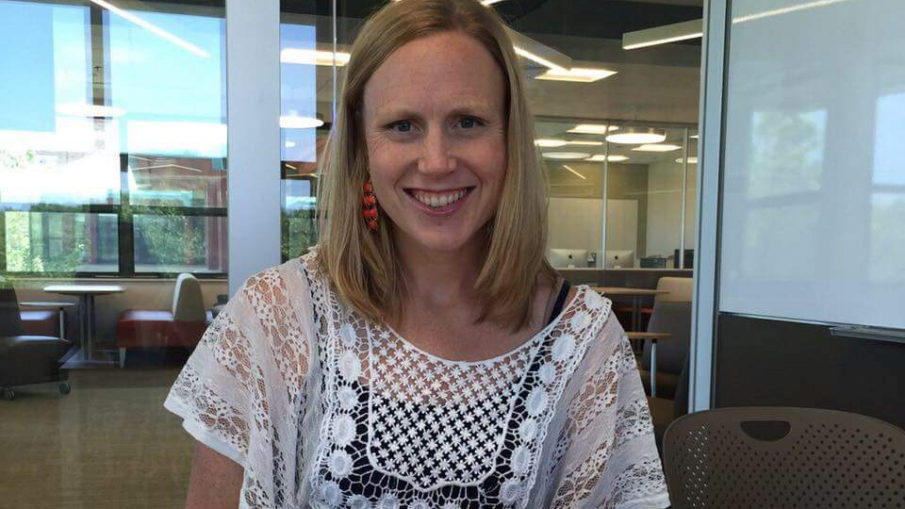You hear her before you see her.
The click of Professor Anne Hofmann’s high-heeled shoes echoes down the hallway. She pauses for a moment to stop and chat with a coworker before she returns to her office, where one of her students is already waiting for her, eager to share the news of a newly acquired job interview.
“That’s wonderful,” Hofmann exclaims with genuine excitement in her voice. Both teacher and student retreat into her office where she can offer advice.
Hofmann doesn’t hesitate when saying that seeing her students succeed is the most rewarding part of her job.
The combination of her sophomore English teacher and Robin Williams in Dead Poet’s Society inspired Hofmann — 16 at the time — to pursue a career teaching English.
Her tiny office is brimming with life. Her bookshelf displays a stark contrast between a collection of textbooks and a child’s painting — resembling something of a family portrait. Pictures of her family line the shelves above her desk.
“I think education gives people a voice,” Hofmann said. She then pauses to gather her thoughts. “It gives people the opportunity to know how to clearly communicate — not just what they want out of their own lives, but maybe how to change systems in the world around them.”
And the concept of changing systems isn’t new to Hofmann, either. In college, she played on the men’s water polo team before going on to found the women’s team.
She laughs when she recalls an instance of her facing the education system at an even younger age.
“It just didn’t make sense to me, and I questioned it. I advocated for myself, even at age 7,” said Hofmann, describing the time she refused to participate in a second grade class project. It’s a story she’s told her students multiple times.
As for her career, Hofmann has taught for nearly 20 years in multiple locations, allowing her to see the way that “education exists differently in different places.” Her switch from high school to college-level teaching has also been formative.
“Often times as a teacher I’ve run into things — of what I want to do in my classrooms — that I’ve been told can’t happen that way,” Hofmann said, describing what spurred her to begin teaching at a college.
She views getting her job at FCC as a career-defining moment, pausing for a moment to gush about the support of her colleagues.
“It brings all my skills and interests together in a way that I feel I can really make a difference — a little bit of a difference, somehow,” she said, nodding to herself.
Of course, Hofmann probably has her parents to thank for much of her spirit. At age 40, her mother went back to school to earn a doctorate degree, along with raising her four children. Her father, as well, was a civil rights activist in the deep south. Together they’ve raised a self-defined “generally likeable? But very opinionated,” daughter, says Hofmann.
Now Hofmann, a mother of two herself, is following in her own mother’s footsteps: Working on earning her doctorate in American Studies.
“It’s the black belt of academia,” she said on her decision to return to school. “It’s hard.”
But Hofmann knows a thing or two about hard things. She wants to inspire students to look at failure as a learning opportunity.
“Always be hopeful that you can get through whatever is hard,” she said, leaning forward in her chair. “You can do hard things.”
Her small office grows quiet for a moment and a contemplative look falls over her face. Arms crossed, she realizes the advice she gives her students is the same advice she’s received countless times.
“I remember my parents always saying, you know, ‘You can do hard things. Things will be hard but you can do it,’” she laughs. “Take the risk, do the hard thing. Even if you don’t do it right, or you fail, you have to keep doing the hard things or you’ll never know what you can accomplish.”
This wisdom from her parents is now solidified, backed by years of experience and rooted in her own successes.
As for the future, all she knows is she wants to keep teaching, with hopes of moving “into a position where I have the power to make decisions about education, decisions about public school reform.”
Hofmann leans back in her chair and laughs to herself.
“There’s a lot of work to do,” she said.


If anyone can make positive changes in American education, Professor Hofmann can. She is bright, passionate, and has the hardest work ethic of anyone I’ve ever had the pleasure to know.
She can replace Betsy DeVoss…I will help